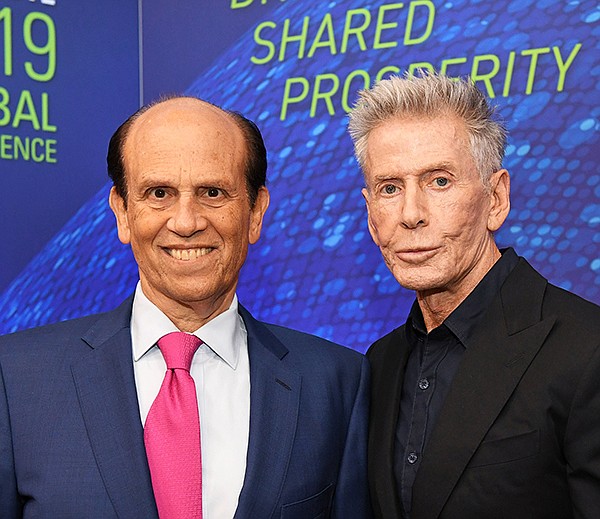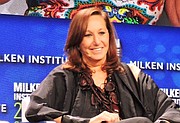FASHION DESIGNERS TALK
Designers Calvin Klein and Donna Karan Talk About Their Brands at Annual Beverly Hills Finance Conference
In 1968, Calvin Klein founded his self-named fashion company and spent years building up a brand that became renowned for style, sophistication, and sexy jeans and underwear ads.
He sold that company to PVH Corp. in 2002 for $435 million, but fashion is ever on his mind as he watches social media and the Internet change the landscape for creating brands and clothing.
“Social media and the Internet changed everything,” Klein observed. “Instagram replaced fashion magazines. When I was building the brand, it was print, TV, outdoor billboards and buses. Now look at Kylie Jenner. In three years she has built a $900-million business [Kylie Cosmetics] with seven people on her team. You could not do that years ago. The game has changed, and the fashion industry hasn’t quite figured it out. That is the real challenge.”
Klein was speaking at one of the various sessions at the Milken Institute Global Conference held April 28–May 1 at The Beverly Hilton. The conference is a gathering of some of the most influential financiers, politicians and celebrities around the world where baseball player Alex Rodriguez was talking about going from sports to business and Ivanka Trump was on a luncheon panel about shared prosperity. The Milken conference has often been called the Davos of North America.
Klein was one of two celebrated fashion designers who participated in the conference’s panels and interview sessions. Donna Karan was on a panel about women rising to the top.
Klein, now 76, was interviewed in a May 1 session by investor Michael Milken, who helped finance the high-end New York label many years ago.
Milken asked Klein about the importance of deciding he needed outside financing. “For starters, if you are the creator [of a label], you are concentrating on the design,” Klein said. “But you can’t be a creative person locking yourself in the design studio. To be successful, you have to be in touch with everything that is going on.”
Klein remembered when Milken started telling him what he had to do financially to improve his company. “I knew instantly this would be the thing that would save us,” the designer said.
Having a creative advertising campaign also helped the brand. Klein recalled the famous TV ad featuring a then-15-year-old Brooke Shields saying that nothing got between her and her Calvin Klein jeans. Then there were the underwear ads with now-famous actor Mark Wahlberg featuring this muscular young model wearing a pair of Calvin Klein briefs. “I opened up my own in-house advertising agency. I knew what the message was, and who could do it better than us?” he said.
Klein said he was always interested in becoming a global company long before other fashion houses were thinking beyond the U.S. market. “I was thinking globally right from the start,” he said. “You can achieve that if you have a good brand.”
He said Nike is a good example of brand building that has gone global. “They don’t even put their name on their product,” he observed. “Just a swish and you know it is Nike because they have created something fantastic through their imagery. People know it is exciting, tough and athletic.”
But he said he is troubled about what is happening in the fashion industry when big corporations buy up brands and don’t continue with the brand’s identity. A few months ago, PVH Corp. announced it was closing the Calvin Klein flagship store on Madison Avenue in New York and was in talks with G-III Apparel Group to take over the brand’s women’s jeans label.
“When designers come to work at a [corporate-owned fashion] house that has a brand and stands for something, they sign a two-year contract. They are not paying attention to what the brand stands for and really hurting the brand. Then after two or three years they are gone, and that is not a good thing.”
In 2016, Belgian designer Raf Simons signed a three-year contract to take charge of the Calvin Klein collection and was gone by late 2018—eight months before his contract expired.
Klein noted that the chief executive officers of these big companies are choosing the chief designers for the brands they have acquired, and this doesn’t always work out. “It is a struggle. It is not easy,” he said about protecting a brand’s DNA.
Going Zen
On April 29, Donna Karan was on a panel with a number of high-powered women speaking about getting to the top of their profession as a female. She shared the stage with former California Congresswoman Jane Harman; former head of Paramount Pictures Sherry Lansing; head of Epic Records Sylvia Rhone; and Anastasia Soare, known as the “Eyebrow Queen,” who founded the beauty-products company Anastasia Beverly Hills.
Karan started her iconic Donna Karan label in 1984 after graduating from the Parsons School of Design and working as head of the design team at Anne Klein. In 2001, she sold her company to LVMH Moët Hennessey Louis Vuitton for $243 million.
For a while she stayed on with her company, but in 2007 she created a new company called Urban Zen, a luxury label that features comfortable clothing made of knits and other fabrics that amply cover the body.
The designer said one of the reasons she created the label is that she couldn’t find brands that she could wear anymore. She also is a lifelong yogi and wanted to share that Zen feeling with a clothing line that is different. “Urban Zen doesn’t follow the rules of fashion,” she said. “I deliver in season. I don’t believe in showing clothes before they are in the stores or during Fashion Week. I believe the customer needs to buy now, wear now and when the weather is appropriate.”
She loves Urban Zen because it is much smaller than her original fashion house, which grew exponentially, later adding a more affordable label called DKNY. “When you become a large label, it becomes hard to control and say what you want to say,” she noted.
Even though she is 70, she doesn’t want to retire. She not only wants to dress people comfortably, but she also wants to improve our healthcare system, our educational institutions and the environment. “There is so much to do in this world today,” she said. “And I do feel that responsibility.”























